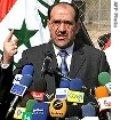In the wake of his strong showing in January provincial elections, a confident Iraqi Prime Minister Nouri al-Maliki is calling for reconciliation between former foes, including supporters of deposed Iraqi dictator Saddam Hussein.
Prime Minister al-Maliki urged a gathering in Baghdad of the Bani Wail, a large Iraqi Shi'ite tribe, to work for "reconciliation" with their fellow Iraqis. Al-Maliki stressed that this was the only way to rebuild their war-torn country.
"Iraq," he said, "must open its bosom to all those who want to help rebuild the country, and in that vein, we must continue with our efforts to counter those who stand in the way of rebuilding. Those who are corrupt, we have done much to combat them, but there are still many who remain. They must be fought, like we fought al-Qaida, the Takfiris, the militias and other outlaws." Despite his plea for reconciliation, Mr. Maliki has angered many Iraqi political and tribal leaders, especially those from the rival Sunni sect, with a project to create tribal councils loyal to himself.
A number of key political figures have opposed the set up of such councils, causing a recent rash of discord, and upsetting US-brokered attempts at reconciliation.
Top Sunni politicians accuse Mr. Maliki of trying to create a power-base along the lines of the U.S.-sponsored Sunni Awakening Councils to promote his own political fortunes in the lead-up to parliamentary elections, next year.
A recent surge in violence in Iraq, including a truck bombing that killed at least 10 people and wounded over 50 in the predominantly Shi'ite town of Hilla, suggest that a latent Shi'ite-Sunni conflict continues, despite attempts to calm tensions. Baghdad political science professor Sa'ad al-Hadithy says that the inability to heal the political conflict in Iraq inevitably leads to violence. Political conflicts between the many different political forces, he says, give a perfect cover for militias to resort to violence. Many political parties, he stresses, are still armed and whenever the political process grinds to a halt, they use their arms to try and impose their views on others.
Hadithy asserts that the political dialogue between rival forces is an "on-again, off-again" thing that quickly degenerates into shouting matches, and then violent conflict. He says that as soon as the public discourse or shouting matches in the media reach a certain level, the violence spills over ... some, he says, are fighting U.S. policy, while others are combating Iranian schemes in Iraq, and the government is unable to contain the violence that results.
Many Iraqi sunni leaders oppose the Maliki government's increasingly warm ties with Iran. Iraqi and Iranian leaders have recently traded visits and pledged increased cooperation in the fields of trade, culture, education, and manufacturing.
Iraq and Iran fought a bitter and bloody seven-year war between 1981 and 1988 in which hundreds of thousands died and thousands of prisoners were taken, on both sides.
By Edward Yeranian Cairo 06 March 2009

